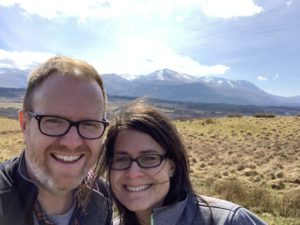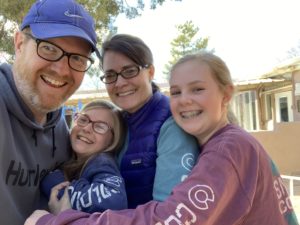 Some of the most incredible people in this world are influential because of how they have chosen to react to what life has given them. We all go through life’s highs and lows and do our best to learn from each experience. Often times, we look at certain figures in our life and think of them as more than human in terms of being incapable of making mistakes. This is an interesting misconception, since it is because of their life experiences that they have become the incredible people that they are. We were able to talk to Dr. Andy Little, Associate Dean of the College of Business Administration and Management Sciences professor, about how some of those experiences brought him to where he is now.
Some of the most incredible people in this world are influential because of how they have chosen to react to what life has given them. We all go through life’s highs and lows and do our best to learn from each experience. Often times, we look at certain figures in our life and think of them as more than human in terms of being incapable of making mistakes. This is an interesting misconception, since it is because of their life experiences that they have become the incredible people that they are. We were able to talk to Dr. Andy Little, Associate Dean of the College of Business Administration and Management Sciences professor, about how some of those experiences brought him to where he is now.
“My father was a biology professor here at ACU, so I always had in the back of my mind that I might teach at a university someday, but I didn’t have a defined plan. I left ACU and went straight to law school, and my goal after law school was to practice law. Teaching at a university bounced around in my mind from time to time, but I was too busy trying to establish myself as a lawyer to give much thought to a career change. The career change and entry into academics happened almost accidentally in 2010, when I wasn’t really looking for a job at ACU. The old business law professor at ACU left for another university that spring, and the Management Sciences department chair sent out inquiries to several practicing attorneys asking if we had any interest in applying for the open position. Given my interest, I jumped at the opportunity, went through a couple of rounds of interviews, got offered the job in spite of all my failings, and the rest is history. But there was never really a plan. It kind of just happened.”
An assumption could be made that for most of us, nothing ever goes along with what “our” plan was supposed to be. Life throws all of us a curve ball from time to time. Seeing others go through the same struggles and victories as our own is encouraging as we look at who we want to be and how that power is in our hands.
“My faith has changed quite a bit over the years. I am less certain of things now that I am in middle age than I used to be when I was younger, when I was pretty sure of most things. I am also more open to different people having different faith experiences. I am in the process of learning to appreciate a less dualistic (the separation of spirit and body, mind and matter, eternal and temporal), cognitively-driven faith. This has significant ramifications for me, but it’s not an easy journey. I am definitely wandering through the wilderness, but I’ve come to enjoy being here, reliant on the presence and provision of God.”
Dr. Little’s incredible character is evident to students as he seeks support in God and his community to help him grow and find assurance in his identity in Christ. In the classroom, this testimony is lived out in the way that he encourages others to take new things into account and have their ideology challenged. 
“I am hopeful that my lived experience, which includes teaching law courses in COBA, is part of my overall experience of faith. I think this would probably look fairly similar whether I am at ACU or an institution that claims no religious affiliation. While an ACU professor should self-identify comfortably as a Christian, an identification that could be a challenge elsewhere, the teaching methods of a Christian professor can occur anywhere. By this I mean, in our law classes in COBA, I attempt to speak truth to power, lay bare the logic of economic and legal structures and institutions, and provide alternative understandings. I usually try to befuddle students by convincing the humble that they know more than they think, and showing the proud that they have fewer answers than they would wish. I think these methods are some of the ways one might teach in a Christ-like manner, even if one never mentions Christ. I also try to be funny. I presume Jesus liked humor. At least I really hope so. Plus, if one doesn’t laugh at the tragedy of the law then one would likely cry.”
Little lives into the philosophy “let your actions speak louder than your words” with the juxtaposition that your words are your actions. Ask most COBA students, and they would agree that they have learned a lot from Dr. Little as he strives to stretch them in their learning while stretching himself in the process.
In reference to COBA, he says “This is a good place, with outstanding people. It’s an honor to teach our students, and work alongside our staff and faculty. One thing I’ve learned in my nine years at ACU is that faculty are harder to manage than lawyers.“
A final word: “We need to learn to live in harmony with God’s creation, rather than assuming mastery and domination over it. Our relationships with God and with each other, our work, our cultures, our institutions, our techniques and technologies, and our futures would all benefit from a more humble approach to our place in creation. I am still learning this every day. “